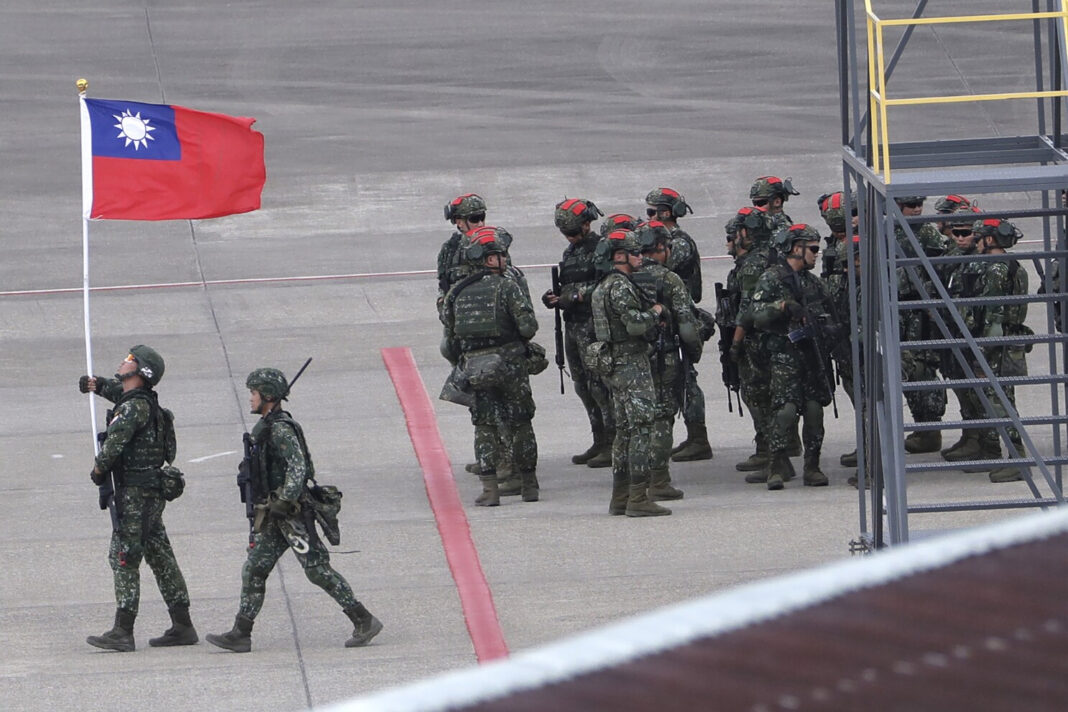In a significant national security case, the Taipei District Court has convicted four former Taiwanese military personnel for selling sensitive internal documents to a middleman working for Chinese intelligence services. The court found them guilty of violating national security laws and accepting bribes, sentencing them to various prison terms.
The ruling, issued on Wednesday, underscores the increasing concerns over espionage activities in Taiwan amid heightened cross-strait tensions. The case highlights how China’s intelligence agencies continue to seek classified information from Taiwan’s military and government institutions.
Court Ruling: A Betrayal of the Nation
In its judgment, the Taipei District Court strongly condemned the four former soldiers, describing their actions as a “betrayal of the country.”
- The court emphasized that military personnel undergo rigorous training to protect Taiwan’s security and sovereignty.
- Instead of upholding their duty, they accepted bribes and leaked sensitive, non-classified internal documents from key security and intelligence units to an intermediary working for Chinese intelligence.
- The leaked documents were deemed to have the potential to harm Taiwan’s national security.
Who Were the Convicted Individuals?
The four convicted individuals, identified by their last names, are:
- Lai (賴) – Sentenced to 7 years in prison
- Li (黎) – Sentenced to 6 years and 8 months
- Lin (林) – Sentenced to 5 years and 10 months
- Chen (陳) – Sentenced to 6 years and 5 months
Additionally, all four were ordered to return the money they received for the leaked documents.
The sentences, however, can be appealed.
The Espionage Network: How Did It Work?
Recruitment and Initial Leaks
- The Taiwanese Ministry of National Defense (MND) revealed that three of the individuals (Lai, Li, and Lin) were members of the 211th Military Police Battalion, which is responsible for guarding the Presidential Office.
- The fourth individual (Chen) worked in the MND’s Information, Communications, and Electronic Force Command – a critical unit handling military communication and cyber operations.
In April 2022, Lai and Chen began leaking internal military documents to a middleman, a Taiwanese man surnamed Huang (黃), who is believed to be an agent recruiting spies for China.
- Huang remains at large, raising concerns that there may be a larger espionage network operating within Taiwan.
- Chen initially took photographs of sensitive military documents, passing them to Lai, who would then relay the images to Huang.
Expansion of the Spy Ring
- After Lai was transferred to another military unit, he recruited Li to continue photographing and leaking documents.
- Later, Li passed the responsibility to Lin, who continued until he retired in February 2023.
- This shows that the network was actively growing, with new recruits taking over the task to ensure a steady flow of information.
Financial Rewards for Espionage
Prosecutors estimated that the four convicted individuals received the following amounts for their actions:
| Name | Amount Received (NT$) | Amount in USD (Approx.) |
|---|---|---|
| Lai (賴) | 460,000 | $14,201 |
| Chen (陳) | 450,000 | $13,900 |
| Li (黎) | 664,100 | $20,500 |
| Lin (林) | 265,900 | $8,200 |
The money was paid as bribes to ensure that the espionage activities continued over time.
Investigation and Arrests
The Taiwanese authorities launched an investigation in August 2024 after receiving a tip-off from a soldier who suspected espionage within the military.
- The MND worked with the prosecutors to track the flow of information and establish how documents were being leaked.
- The suspects were arrested, and the case was sent to Taipei District Court for trial.
This case is one of many recent incidents where China has been accused of infiltrating Taiwan’s military to gain intelligence on its defense systems, strategic operations, and government policies.
What This Means for Taiwan’s National Security
1. Growing Chinese Espionage Threat
- Taiwan has been a target of China’s intelligence operations for years.
- Cases like this indicate that Chinese agents actively seek military leaks from within Taiwan.
- The use of middlemen suggests that China prefers indirect recruitment to avoid detection.
2. Stricter Counter-Espionage Measures Needed
- Taiwan’s military may tighten background checks and increase security protocols to prevent further leaks.
- New laws could be introduced to impose harsher penalties for espionage.
3. Increased Taiwan-China Tensions
- This case comes amid increased tensions between Taiwan and China.
- China has repeatedly increased military pressure on Taiwan, raising concerns about its intentions regarding a possible invasion.
FAQs
Why were these former soldiers convicted?
They were convicted for violating national security laws and accepting bribes to sell sensitive military documents to a Chinese intelligence operative.
How were they caught?
The Ministry of National Defense launched an investigation in August 2024 after receiving a tip-off from a soldier.
What kind of information was leaked?
The documents were not classified but contained sensitive military details about Taiwan’s security and intelligence units.
Who recruited them?
A Taiwanese man surnamed Huang acted as a middleman and recruiter for Chinese intelligence.
How much money did they receive?
The four individuals received a combined total of approximately NT$1.8 million ($56,800 USD) in bribes.
Is the case still open?
Yes, the sentences are subject to appeal, and investigations are ongoing to track down Huang and other possible recruits.


